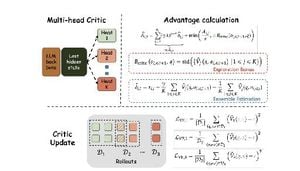The rise of China's DeepSeek AI has sent ripples through the U.S. tech industry, prompting unprecedented security concerns and ethical dilemmas. The U.S. Navy recently issued directives prohibiting its personnel from using the DeepSeek AI model, citing risks associated with AI technologies developed by foreign powers.
On Monday, January 29, 2025, news broke about DeepSeek's impressive showcase of its AI capabilities. The startup, based in Hangzhou, China, reported it had spent only $5.567 million to train its DeepSeek-V3 model, claiming it could stand toe-to-toe with American AI giants like OpenAI and Google. This figure immediately raised eyebrows among industry insiders.
David Sacks, the AI czar under former President Donald Trump, quickly pointed out discrepancies in the reported financial figures. "New report by leading semiconductor analyst Dylan Patel shows... $1 billion on its compute cluster," Sacks wrote on X on Friday. He added, "The widely reported $6M number is highly misleading, as it excludes capex and R&D, and at best describes the cost of the final training run only." These comments spotlight the need for transparency within the sector.
Tech mogul Palmer Luckey also weighed in, criticizing U.S. media for their portrayal of DeepSeek’s training costs. "I think the problem is they put out... to harm U.S. companies," he told FOX Business. He accused media outlets of failing to dig deep, contributing to market panic where U.S. firms, such as NVIDIA, lost hundreds of billions of dollars as stock prices fluctuated wildly.
The Navy's stance on DeepSeek adds another layer of complexity to the situation. An email sent to sailors on Friday, January 31, reiterated the prohibition of using any unapproved AI models, explicitly including DeepSeek after it surged to the number one spot on the Apple App Store. Commander Tim Hawkins clarified the email was meant as a reminder of existing policies, noting, "DeepSeek was mentioned as the most recent example of how this policy applies."
This policy follows previous warnings from the Navy about generative AI's security risks, particularly highlighting the danger of exposing sensitive information through unsecured platforms. The Office of the Director of National Intelligence had previously categorized China as the "most active and persistent cyber threat" to U.S. networks.
Since its launch, DeepSeek has gained rapid attention for its competitive performance—developed within two months at a fraction of the expense incurred by its American counterparts. Its success, displayed by the descent of U.S. chipmakers’ stocks—NVIDIA saw its shares drop 17%—illustrates the disruptive potential cheaper technologies can have on established players.
Key industry figures have responded strongly as well. Sam Altman, the CEO of OpenAI, acknowledged the impressive nature of DeepSeek's results but reaffirmed his commitment to superior technology. Alexandr Wang, CEO of Scale AI, described DeepSeek’s models as "earth-shattering," implicatively framing the competition between U.S. and Chinese AI developments as part of an "AI war."
Trump himself has labeled this situation as a "wake-up call" for the American tech industry. His administration’s recent Stargate initiative aims to bolster investments in domestic AI infrastructure, which may allocate billions to counter the competitive edge seen from DeepSeek.
Nevertheless, the company experienced operational issues, stating it temporarily limited user registrations due to "large-scale malicious attacks". But DeepSeek resumed normal operations swiftly, reflecting its resilience against external threats.
Despite the clarifications from the Navy about the misunderstanding of its directive, the threat posed by DeepSeek continues to loom large. The U.S. government remains vigilant, assessing the potential dangers foreign AI models pose and pushing for stricter evaluation processes on AI technologies.
DeepSeek’s swift rise illuminates not just the growing prowess of Chinese tech firms but raises alarm bells for U.S. national security and the balancing act it must navigate amid fierce global competition.



